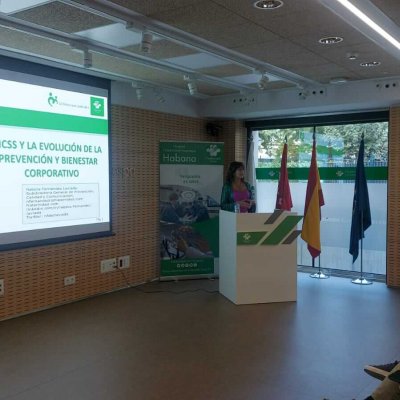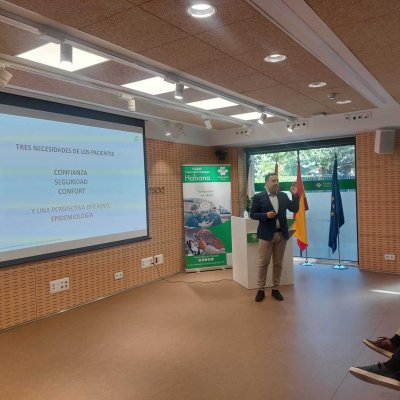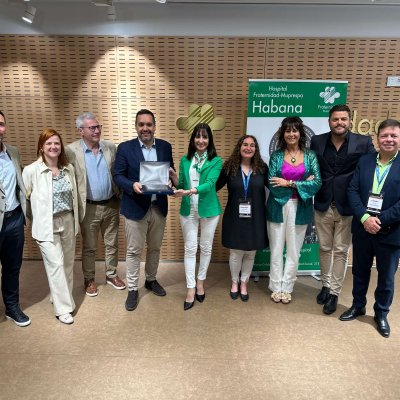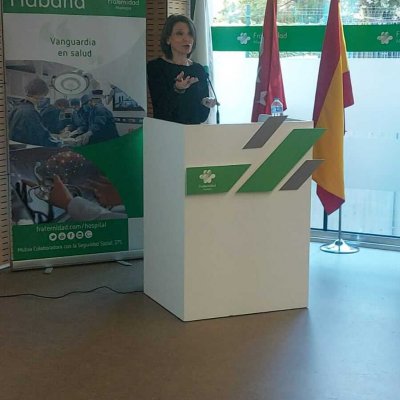
The Fraternidad-Muprespa Habana Hospital hosts the “Prevention and Health” conference
The Fraternidad-Muprespa Havana Hospital has hosted the “Prevention and Health” conference, with the Society of Occupational Medicine of the Province of Buenos Aires (SMTBA), within the framework of the First International Program for Leaders in Occupational Health (PILSO 2025). This event, in which directors of the Mutua Collaboradora con la Seguridad Social have participated, is part of a series of activities held in Madrid between September 22 and 26.
During the day, key topics were addressed, such as the evolution of occupational risk prevention in Spain, its impact on business culture, the role of Mutual Collaborators with Social Security as agents of preventive change, the integrated vision of occupational health and health management based on excellence.
Dr. Sari Mayoralas, manager of the Hospital, opened the event and highlighted that the center is the flagship of Fraternidad-Muprespa.
We want you to know not only our technology, but also what really defines us: human quality
Maximiliano Varone and Samanta C. Kameniecki, president and vice president of the SMTBA, spoke next to thank them for their collaboration in organizing the International Program.
Natalia Fdez. Fundación Personas y Empresas - AUREN4 , Deputy General Director of Prevention, Quality and Communication of Fraternidad-Muprespa, took the floor to highlight the fundamental role of Collaborating Mutual Insurance Companies with Social Security, this year which marks 125 years since its creation.
He highlighted that since 1967 they began to operate as they do today, and that the 18 that currently exist, integrated into the state public sector of an administrative nature, carry out a very relevant work for society. He highlighted:
Although we have been working for occupational health for more than a century, we continue to be little known to many, even though 98% of Spanish companies are with a mutual professional contingency, and 81% in common contingency
He also explained that they manage workers' social insurance contributions, seeking to save public funds and reduce the economic impact of sick leave due to occupational illness or work accident.
Mar Morales , director of Prevention and Health Culture of Fraternidad-Muprespa, focused her words on the need to convey to society the importance of preventive culture in a country with a majority of SMEs, 98% of the Spanish business fabric .
"We have a lot of documentation, but a preventive culture that can be improved. For safety to be authentic, it has to be exercised on a daily basis" he highlighted, going on to add that sectors such as construction and agriculture continue to lead the accident rates.
Morales explained the importance of a new strategy based on success stories and practical tools, using process maps to identify starting points and visualize the path to change, which involves the important role of middle managers.
"They are the key piece. If they do not understand the risk, they cannot manage it. That is why we train them with tools that connect them with the reality of the work environment" concluded the intervention.
Esteban Mate , deputy general director of Management of Fraternidad-Muprespa, took the floor last and presented the care model that the Mutua has consolidated in recent years, focused on three pillars for the patients: trust, security and comfort.
Not all patients are the same nor need the same thing. That is why we have designed an adaptive model, with specialized units and professionals with proven clinical background
Currently, in the Hospital there are three reference trauma units: shoulder, lower limb and spine. In addition, it is the only one in the sector that offers plastic surgery, which allows a comprehensive recovery.
Likewise, it offered relevant healthcare data: in 2024, 52% of Mutua's surgeries were performed at the Fraternidad-Muprespa Habana Hospital; The surgical waiting list is just nine calendar days, while the waiting in consultation is only three days, figures that contrast with the longest waiting lists in the public system after the COVID-19 pandemic.
“We develop clinical guidelines that optimize resources and guarantee agile and safe care,” explained, also adding that “overall patient satisfaction reaches a score of 8.2, reflecting the commitment to continuous improvement and personalized care. We want all complex patients to be treated in this Hospital”,he concluded.
The day ended with a guided tour of the Hospital facilities.












